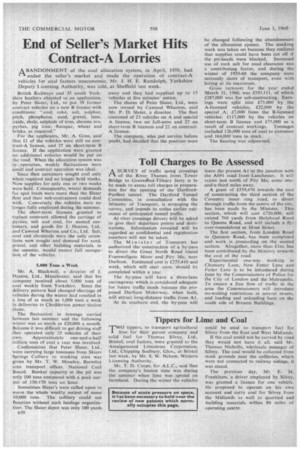End of Seller's Market Hits Contract-A Lorries
Page 76

If you've noticed an error in this article please click here to report it so we can fix it.
A BANDONMENT of the coal allocation system, in April, 1959, had r-k ended the seller's market and made the operation of contract-A vehicles for coal factors uneconomic, Mr. J. H. E. Randolph, Yorkshire Deputy Licensing Authority, was told, at Sheffield last week.
British Railways and 35 south Yorkshire hauliers objected to an application, by Peter Slater, Ltd., to put 39 former contract vehicles on a new B licence with conditions: "coal, coke, salt, sulphur, pitch, phosphates, sand, gravel, lime, oxide, shale, sulphide of iron; chrome ore, pyrites, pig iron, fluespar, wheat and bricks, as required."
For the applicants, Mr. A. Goss, said that 12 of the vehicles were still on contract-A licence, and 27 on short-term B licence. If the application were granted no additional vehicles would be put on the road. When the allocation system was irt operation, weekly fluctuations were small and-contract operation was. ideal.
Since. then customers sought coal only When required and no longer held stocks: Now supplies for only one or two Weeks were held. Consequently, winter demands for spot loads were more than the Slater fleet and their sub-contractors could deal with. Conversely the vehicles were no longer fully employed during the summer.
The short-term licences granted to replace contracts allowed the carriage of pyrites, salt and coal, for named customers, and goods for J. Heaton, Ltd., and Cawood Wharton and Co., Ltd. Salt, coal and chemicals were the only extentions now sought and demand for sand, gravel, and other building materials, in the summer,. would ensure full occupation of the vehicles.
5,000 Tons a Week
Mr. A. Blackwell, a director of J. Heaton, Ltd., Manchester, said that his company received about 5,000 tons of coal weekly from Yorkshire. Since the delivery pattern had changed shortage of vehicles during the winter had resulted in a loss of as much as 1,000 tons a week in deliveries to Chadderton power station alone.
The fluctuation in tonnage carried between last summer and the following winter was as much as £20,000 a month. Beause it was difficult to get driving staff they operated only 25 vehicles of their own. Approximately one-and-a-half million tons of coal a year was involved.
Confirmation that Peter Slater, Ltd., were carrying large tonnages from Skiers Springs Colliery to stocking sites was given by Mr. T. W. Moseley, Barnsley area transport officer, National Coal Board. Bunker capacity at the pit was only 100 tons compared with a peak output of 150-170 tons an hour.
Sometimes Slater's were called upon to move the whole weekly output of some 10,000 tons. The colliery could not function without such haulage organization. The Slater depot was only 100 yards B30 away and they had supplied up to 15 vehicles at five minutes' notice.
The shares of Peter Slater, Ltd., were now owned by Cawood Wharton, said Mr. P. D. Slater, a director. The fleet consisted of 23 vehicles on A and special A licence, two on full-term and 27 on short-term B licences and 22 on contractA licence.
The company, who put service before profit, had decided that the position must
he changed following the abandonment of the allocation system. The stocking work was taken on because they realized that supplies could have been cut off if the pit-heads were blocked. Increased use of rock salt for road clearance was• a contributing factor, and during the winter of 1959-60 the company were seriously short of transport, even with hiring at its maximum.
Gross turnover for the year ended March 31, 1960, was £593,111, of which £287,000 was for sub-contracting. Earnings were split into £75,000 by the A-licensed vehicles; £32,000 by the special .A; £7,000 from the B-licensed vehicles; E117,000 by the vehicles on short-term B licence and £75,000 as "a restilt of contract workings. Tonnages included 126,000 tons of coal to customer and. 164,000 tons to stock.
The hearing was adjourned.
















































































































